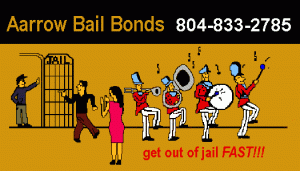I often get asked how to become a bail bondsman in Virginia, so I decided to write this post describing the basic, high-level steps to do it. As the title implies, bail bonding is regulated by each state, so this article applies only to becoming a bondsman in Virginia. Bail bondsmen in Virginia are regulated by the Virginia Department of Criminal Justice Services ( DCJS ). The codified rules, regulations, and prerequisites can be found here.
The first step is to take the bail bondsman course, which is only a 40 hour course. Refer to DCJS for a certified instructor in your area.
The next step is to decide which category of a bondsman you’re going to become: property bondsman or surety bondsman.
Property Bondsman
To be a property bondsman, a minimum of $200,000 of personal property is to be pledged as surety the bail bonds you write. So this means that if you write a bad bond and results in a forfeiture, you either pay the court or risk losing your property. [Note: A bail bond forfeiture is when a someone skips court and is not recovered. The full amount of the bond is to be paid to the court. ] Also, there are many strings attached to this. For example, if it’s real estate being pledged, there can be no other liens against the property and the property cannot be released until all the bonds written against it are closed. Obviously, if you’re thinking on selling the property in the near future, this is not a good option.
Surety Bondsman
To be a surety bondsman, you’ll essentially be writing bonds for an insurance company, and they’ll be ultimately financially responsible to the court for the bonds you write. However, that’s only if you don’t pay a bond forfeiture. But the reality is that if you write a bad bond, you’re going to have to pay the court; it rests on you. If you don’t pay it, the insurance company will do it and you’ll likely be dropped by the insurance company. A requirement to become a surety bondsman is you’ll have to pass the Virginia property and casualty insurance exam.
The advantage of being a surety bondsman is there is no limit to the amount of liability in bonds you can have because the insurance company is backing your bonds. If writing property bonds, the liability you can have is four times the amount of property pledged. For example, if you pledge $200,000, then you’re limited to $800,000 in liability at any given time.
The advantage of being a property bondsman is you get to keep the entire 10% premium of the bond. For surety agents, the insurance company gets their cut of the premium, usually anywhere between 15 to 30 percent.
After that, you have to get licensed with DCJS, which involves submitting the appropriate documents and paying the fees.
Once that is complete, you’ll be able to start writing bail bonds. Something to bear in mind is while it’s not too difficult to become a bail bondsman, it’s a more challenging staying in business as a bondsman. You have to get phone calls to get bonds and make money, and should therefore have a plan for doing so.
Thanks for reading this. If you have any questions, feel free to contact Aarrow Bail Bonds at 804-833-2785.
